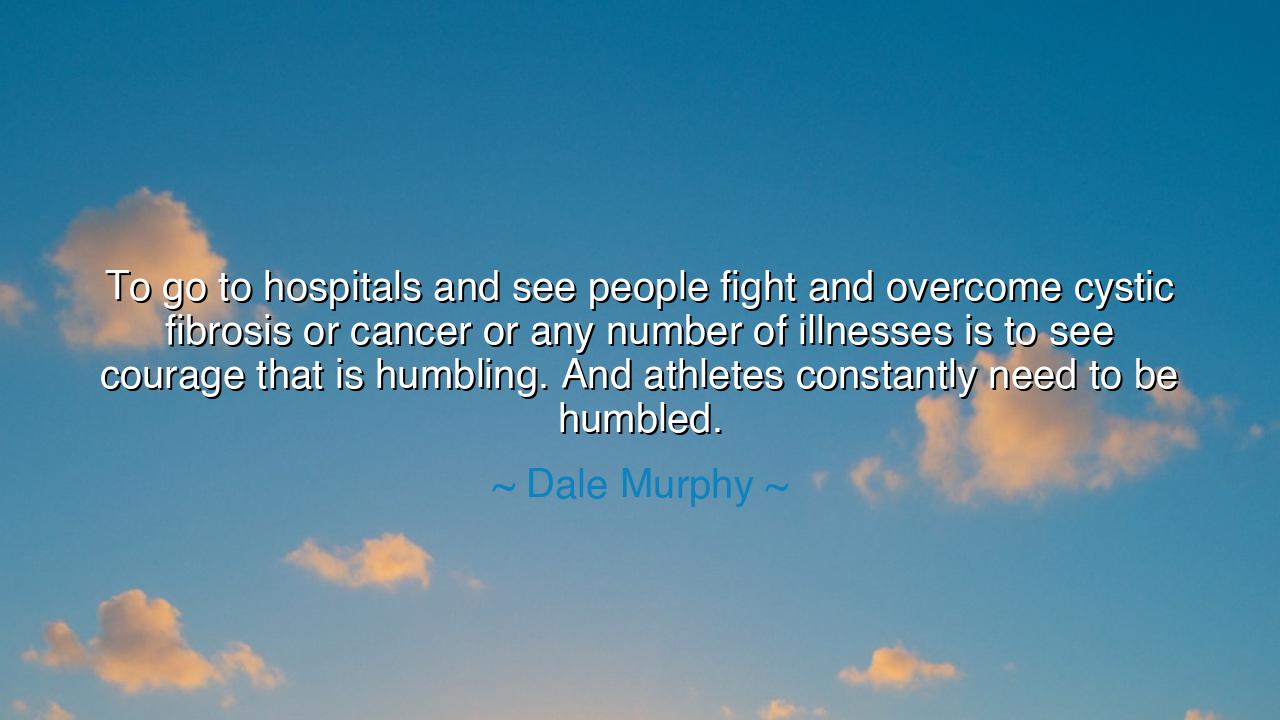
To go to hospitals and see people fight and overcome cystic
To go to hospitals and see people fight and overcome cystic fibrosis or cancer or any number of illnesses is to see courage that is humbling. And athletes constantly need to be humbled.






“To go to hospitals and see people fight and overcome cystic fibrosis or cancer or any number of illnesses is to see courage that is humbling. And athletes constantly need to be humbled.” Thus spoke Dale Murphy, the great baseball player known not only for his strength on the field but for the nobility of his spirit. His words shine with a rare kind of clarity—the kind that comes when one has looked beyond the glory of competition and seen the deeper battle that all human beings share. In this reflection, Murphy reminds us that true courage is not found in stadiums or under bright lights, but in the quiet rooms of suffering, where men, women, and children fight not for trophies, but for breath, for time, for life itself.
In the age of spectacle, we are often deceived into believing that heroes are those who win—the fastest runner, the strongest fighter, the champion crowned before cheering crowds. But Murphy, a man who knew victory, teaches otherwise. He looked upon the patients in hospitals—those whose victories go unseen, whose endurance is not celebrated—and he saw courage purer than any found on the field. For while an athlete’s contest lasts for hours or days, the battle of the sick may endure for years, waged in silence and pain. Such courage is not gilded with applause; it is forged in humility, in the stubborn refusal to yield even when every breath is a struggle.
Murphy’s insight echoes the wisdom of the ancients. Aristotle taught that courage is the highest of virtues because it makes all others possible. But even he spoke of courage in war and politics; few philosophers dared to name as courageous those who fight invisible enemies—disease, despair, and fear. Yet Murphy, with the heart of a sage, saw this truth clearly: that real valor is not only in striking blows, but in enduring them. Those who fight illness embody the deepest kind of strength—the will to persevere when there is no crowd, no glory, only the flickering hope that tomorrow may come.
Consider the story of Terry Fox, the young Canadian who lost his leg to cancer and yet resolved to run across his country to raise money for research. His body was frail, but his spirit burned brighter than any stadium light. He called his journey the Marathon of Hope, and though he could not finish it—his illness claimed him before he reached the Atlantic—his courage inspired a nation and the world. Every year since, millions run in his memory. His was not the courage of conquest, but of endurance; not the glory of triumph, but the majesty of faith. Such are the people Murphy honors in his words—the quiet heroes who remind even the mighty that strength begins in humility.
When Murphy says that “athletes constantly need to be humbled,” he speaks not of shame, but of balance. Success, fame, and physical power can intoxicate the heart, making one forget that greatness is fleeting and fragile. To be humbled is to be made whole again—to remember that the body, however strong, will one day falter, and that victory, however sweet, is never eternal. The humility that comes from witnessing true suffering restores the soul; it teaches gratitude, compassion, and reverence for life. The athlete who learns this lesson becomes more than a competitor—he becomes a servant of humanity, a witness to the sacredness of perseverance.
The lesson, then, is not for athletes alone, but for all who walk in comfort and strength. Seek out what humbles you. Look upon the struggles of others not with pity, but with awe. Let their courage remind you of your own blessings and responsibilities. The sight of those who endure pain with grace should awaken in us both compassion and perspective. For humility is not weakness—it is the soil in which true greatness grows. When we are humbled, we remember our shared fragility, our shared humanity, and we learn once again how to love.
To live by Murphy’s wisdom, practice gratitude daily and honor those who battle unseen. Visit the sick, comfort the weary, and draw inspiration from their resilience. When life grants you success, let it not swell your pride, but deepen your empathy. For as Murphy teaches, the truest heroes are not those who lift trophies, but those who lift themselves each day against the weight of suffering. And if, like him, you learn to see their courage with reverence, you will find your own spirit made stronger, not through triumph, but through humility—and in that humility, you will discover the heart of what it means to be truly human.






AAdministratorAdministrator
Welcome, honored guests. Please leave a comment, we will respond soon